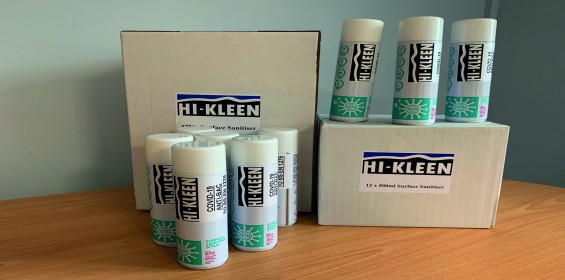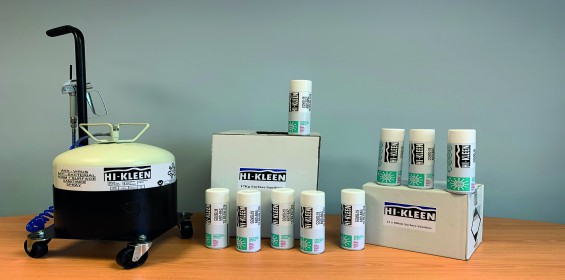Sanitising is the new normal!
Published: 11 August, 2020
PWE spoke to Steve Smith, director, Hi-line Industries Ltd, about how his company went from developing an unbranded sanitising product which was initially used to protect his own staff from COVID-19 to the branded Hi-Kleen and then to an aerosol he could leave behind with his customers, and finally to an established product which now forms a strong part of his business.
Recognising that cleaning, disinfection and sanitisation are essential and crucial activities in the prevention of COVID 19 is one of the first steps towards providing a safe working environment, and deserving of special consideration by all businesses, which combined with the appropriate supply of personal protective equipment (PPE), can help to protect against the spread of the disease in the industrial workplace.
The government recommends increasing the frequency of cleaning paying attention to all surfaces but especially ones that are touched frequently, such as door handles, light switches, and work surfaces. It recommends as a minimum, frequently touched surfaces should be wiped down at the beginning and at the end of each day, and more frequently depending on: the number of people using the space, whether they are entering and exiting the setting, and access to hand washing and hand-sanitising facilities.
Surfaces and belongings can be contaminated with COVID-19 when people who are infectious cough or sneeze or touch them. Transmission of COVID-19 can occur when someone else then touches the contaminated surface or item. The person may become infected if they touch their nose, eyes or mouth with a contaminated hand or object.
With this in mind, Steve Smith, director, Hi-line Industries Ltd, explains that his company initially developed a sanitising product to protect his own staff: “When our service engineers went out to site, they used Hi-Kleen on the equipment they were about to service.
“Once finished the servicing, they sanitised again and handed the machine back to production. Very quickly our customers wanted it for themselves.”
The company went from unbranded kegs of sanitiser to the branded Hi-Kleen and then to an aerosol his engineers could leave behind with the customer, to finally an established product and a strong part of his business.
Steve Smith explains that regular cleaning plays a vital role in limiting the transmission of COVID-19 and paying particular attention to surfaces that are touched frequently or areas of heavy traffic like reception areas, are especially important, as is any equipment that is handled: “This includes the interiors of vehicles, mobile phones, laptops etc and any other handheld devices. Any visits to client’s premises to install or service equipment will need to be taken into account.” He highlights that all items leaving his company’s premises are sanitised using Hi-Kleen room and surface sanitiser prior to despatch.
Promoting effective cleaning and preparation within manufacturing facilities is now fast becoming the new normal, explains Steve Smith. Increasingly all employees will need to be educated and trained to adhere to the new cleaning regimes and working practises used in their specific working environments. He adds that certain members of staff will now need to be responsible for overseeing and ensuring that these are implemented: “Ultimately, it will require a process of ongoing re-education for the “new normal”. The option of implementing or expanding flexible working arrangements may also need to be considered at some point where feasible.”
The biggest obstacle, that Steve Smith says manufacturers are having to overcome to maintain their facilities during the COVID-19 environment is implementing government guidelines regarding employee safety and social distancing within the manufacturing facility. These are normally facilities that are very worker dense, where he says working from home is not an option for most of the manufacturing sector: “The economic impact of having to supply all employees with appropriate PPE and sanitisation products will almost certainly incur added costs.”
Hi-Kleen
However as Steve Smith highlights, there are effective methods of helping to keep premises clean as part of an overall strategy identified during a COVID-19 risk assessment for a facility, which are not cost prohibitive. Smith explains that his company’s product - Hi-Kleen - has been specially formulated to kill/inhibit both bacteria and viruses (including enveloped viruses such as coronavirus) for up to five hours on a variety of surfaces such as handles, handrails, doors, tables and desks, and other areas of frequent contact: “Active biocides present in the formulation provide a longer lasting protection than alcohol-based preparations. It does not stain, is non-corrosive and will give a streak and smear free finish to most polished surfaces including glass and stainless steel.” He adds that the product meets all requirements of BS EN 1276 and 1650 for food handling area sanitisation/disinfection. BS EN 1276 is the European standard for the bactericidal activity of chemical disinfectants and provides proof of efficacy in the control of harmful micro-organisms.
In order to meet the standard, products are tested by an independent laboratory. The product is supplied in 500ml aerosols for small area, targeted use and also 17kg canisters for larger areas. It is suitable to treat surfaces in a wide variety of situations from schools, medical centres, dental practises through to manufacturing facilities and food preparation processing areas. It’s also a validated substance with full documentation and its own safety documentation MSDS, all of which are supplied with the product.
Propellants and sanitiser itself are made to strict ISO standards BS EN1276, however due to its nature as an anti bacterial killer, care has to be taken and full PPE should be worn, and he says it’s as environmentally friendly as possible and all kegs and canisters can be fully recycled.
Misinformation
Steve Smith also highlights the problem of misinformation and the differences and effectiveness of cleaning products in the market to choose from that state they are effective against COVID-19. This ranges from certain world leaders suggesting that injecting with disinfectant will cure COVID-19 through to reports on social media that bleach will kill the virus. It’s no surprise then that manufacturers among others are finding it difficult to choose.

He says that although theoretically you could use a 100% peroxide or bleach, he warns it’s not safe and you can’t put bleach all over your desk, laptop or place setting: “Hi-Kleen has been devised to safely provide an application that will eliminate Coronaviruses and Sars. We saw too many people only a few months ago with cloths and sprays cleaning down and erroneously thinking they were doing it correctly. Remember the public service announcements on hand washing? Now we all use hand sanitisers.”
Ultimately he highlights how this pandemic is a massive reset on how we do everything: “It’s going to be around until the world has a vaccine and like smallpox or TB it will take years to eradicate.”
Engaging with employees
Steve Smith concludes that employees will also need to fully engage in any new cleaning regimes that are implemented. On top of this he explains it is important on a personal level for workers to clean up after themselves and regularly sanitise work areas. In addition, if sanitisers and PPE are provided it is imperative they are used alongside washing hands, which Steve Smith states is equally important. Moving forward new cleaning regimes will have to be considered “the new normal” and be permanently implemented. We will be sanitising as part of everyday life - it’s the new normal.
For further information please visit:
www.hilineindustries.com or contact: 01283 533377







